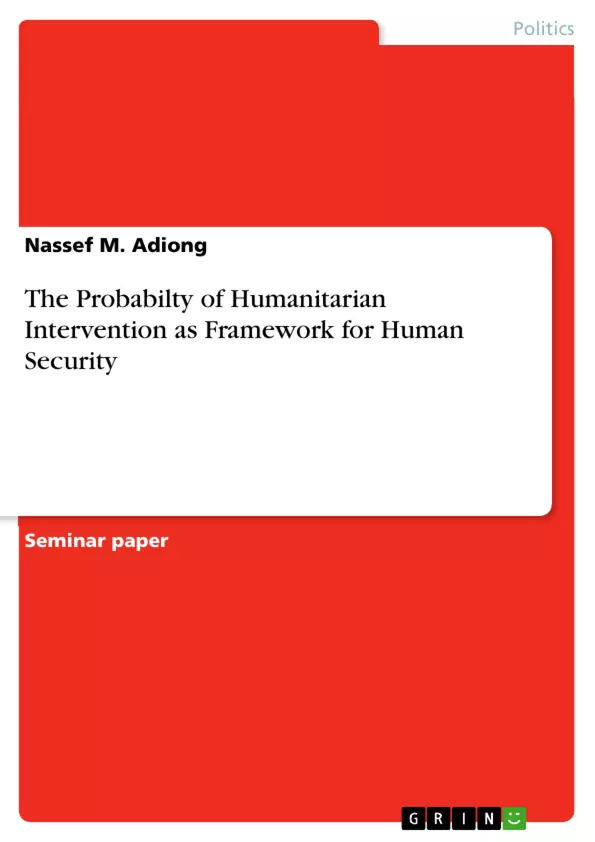The paper aims to present a probable humanitarian intervention as framework of human security. It objectifies humanitarian intervention as an element that will make human security autonomous but not separate nor fully independent from non-traditional security. Several literatures confuses the two terms as synonymous with each other, where others differentiated them explicitly. Thus the essay will address the ambiguity of both conceptions and discuss humanitarian intervention not as a different concept from human security but argues that it may be part and parcel of it, and in fact a possible framework to explain the paradigm of human security autonomous to non-traditional security. This contribution aspires for a sound, simple yet clear and unambiguous interpretation of human security to the evolving field of security especially as a sub-discipline of International Relations. In addition, it will also contend that there is a considerable middle way for both human security and non-traditional security in meeting a tangency point, and that is, a re-conceptualized version of human rights.
Inhaltsverzeichnis (Table of Contents)
- The Etymology of 'Security'
- Theorizing Security in International Relations
- Redefining Security: The Post-Cold War Impact
- Human Security or Non-Traditional Security?
Zielsetzung und Themenschwerpunkte (Objectives and Key Themes)
This paper aims to present a probable humanitarian intervention as a framework for human security. It argues that humanitarian intervention should be considered as a part of human security, not separate from it, and that this framework can help explain the paradigm of human security as autonomous from non-traditional security. The paper seeks to clarify the often-confused relationship between human security and non-traditional security and provide a concise interpretation of human security.
- The ambiguity and relationship between human security and non-traditional security
- The concept of humanitarian intervention as a framework for human security
- The evolution of the concept of security in international relations
- The relevance of human rights in the context of human security and non-traditional security
- The importance of a clear and unambiguous interpretation of human security
Zusammenfassung der Kapitel (Chapter Summaries)
The first chapter explores the historical evolution of the concept of security, tracing its roots from ancient philosophies to contemporary theories. It examines the varying interpretations of security across disciplines like Philosophy, Political Science, and International Relations. The chapter highlights the shift from traditional national security to a broader understanding of human security in the context of post-Cold War challenges.
The second chapter delves into different security theories within the framework of International Relations, highlighting the influence of realism, liberalism, and the Copenhagen School. It examines how the concept of security has been redefined in response to the evolving threats and challenges of the post-Cold War era.
The third chapter focuses on the redefinition of security in the post-Cold War period, emphasizing the emergence of non-traditional security and human security as paradigms for addressing new types of threats. It discusses different approaches to defining human security, particularly the Canadian government's and the UNDP's approaches, and highlights the difficulties in establishing a clear and unambiguous distinction between human security and non-traditional security.
Schlüsselwörter (Keywords)
The key themes and concepts addressed in this paper include human security, non-traditional security, humanitarian intervention, human rights, and the evolution of the concept of security in international relations. The paper analyzes the relationship between these concepts and seeks to provide a framework for understanding human security as a distinct and autonomous paradigm.
Frequently Asked Questions
What is the main argument regarding humanitarian intervention in this paper?
The paper argues that humanitarian intervention is a part of human security and can serve as a framework to explain its paradigm as autonomous from non-traditional security.
How does the paper differentiate human security from non-traditional security?
It addresses the common ambiguity between the two terms, seeking to provide a clear interpretation of human security as a distinct sub-discipline of International Relations.
What is the "middle way" proposed for both security concepts?
The author contends that a re-conceptualized version of human rights serves as the tangency point where human security and non-traditional security meet.
How has the concept of 'security' evolved since the Cold War?
The paper traces the shift from traditional state-centric security to a broader understanding that encompasses individual safety and global human rights challenges.
Which theoretical schools in International Relations are discussed?
The essay delves into realism, liberalism, and the Copenhagen School to explain how security is theorized in contemporary IR.
- Arbeit zitieren
- Nassef M. Adiong (Autor:in), 2011, The Probabilty of Humanitarian Intervention as Framework for Human Security, München, GRIN Verlag, https://www.grin.com/document/179152



